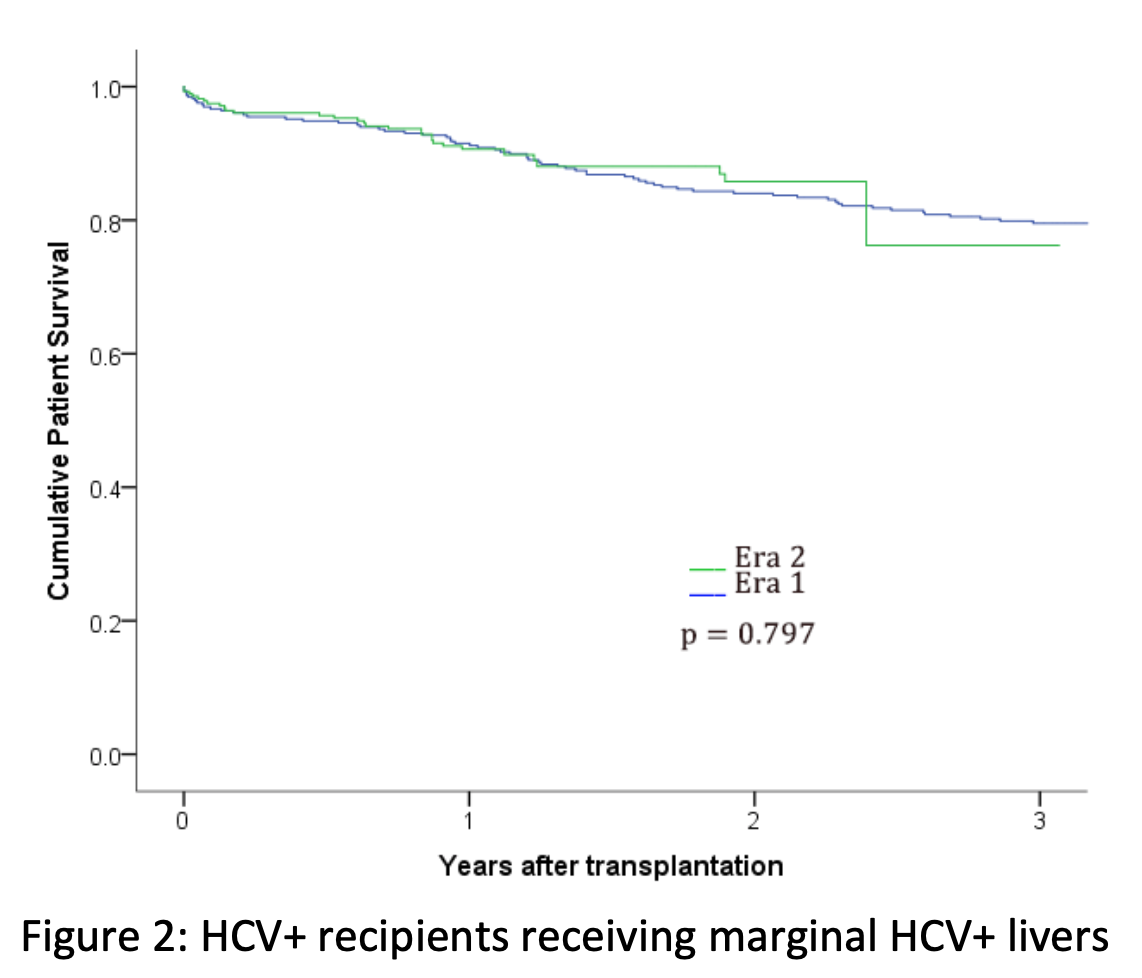Donor Hepatitis C Seropositivity Confers Poorer Post-transplant Outcomes In Recipients Of Marginal Livers In The Post-hepatitis C Treatment Era
University of Kentucky, Lexington, KY
Meeting: 2019 American Transplant Congress
Abstract number: C271
Keywords: Donors, marginal, Hepatitis C, Liver transplantation
Session Information
Session Name: Poster Session C: Liver: MELD, Allocation and Donor Issues (DCD/ECD)
Session Type: Poster Session
Date: Monday, June 3, 2019
Session Time: 6:00pm-7:00pm
 Presentation Time: 6:00pm-7:00pm
Presentation Time: 6:00pm-7:00pm
Location: Hall C & D
*Purpose: Since the introduction of newer antiretroviral therapies, utilization of hepatitis C (HCV) positive livers has increased significantly for HCV recipients. In an effort to utilize all potential livers, marginal liver donors [donor risk index (DRI) >1.65] have been increasingly used in HCV recipients. We describe post-transplant outcomes in the pre- and post-HCV treatment eras.
*Methods: Liver transplant data of HCV positive recipients were obtained from the Organ Procurement Transplant Network (OPTN) and stratified by treatment era: Era 1 (pre-treatment) 1/2010-10/2014 and Era 2 (post-treatment) 10/2014-12/2016. Case matching (1:1) was generated based on age, gender, race, portal vein thrombosis, BMI, MELD and donor HCV status to determine between-era differences. Overall survival between eras and high DRI (>1.65) donor livers were determined using Kaplan Meier product limit estimates.
*Results: Among 8860 subjects, there were no clinically relevant differences in recipient, donor, or transplant related factors between eras. There was a significant increase in survival among HCV patients receiving marginal livers and transplanted in Era 2 compared to Era 1 (p<0.001). A subgroup analysis of HCV positive recipients receiving marginal HCV negative livers showed improved survival in Era 2 compared to Era 1 (p<0.001, Figure 1). Conversely, an analysis of HCV positive recipients receiving marginal HCV positive livers showed no differences in survival between eras (p=0.797, Figure 2).
*Conclusions: While utilization of marginal HCV negative livers in HCV recipients has improved survival in the later era, there is no significant improvement in survival using marginal HCV positive livers. This suggests that donor HCV seropositivity confers a survival risk that is not mitigated by newer HCV antiretroviral therapies. While these antiretroviral therapies have changed the landscape of pre- and post-transplant HCV management, additional studies are necessary to determine appropriate utilization of marginal HCV positive donors.
To cite this abstract in AMA style:
Shah MB, Gupta M, Mei X, Gedaly R. Donor Hepatitis C Seropositivity Confers Poorer Post-transplant Outcomes In Recipients Of Marginal Livers In The Post-hepatitis C Treatment Era [abstract]. Am J Transplant. 2019; 19 (suppl 3). https://atcmeetingabstracts.com/abstract/donor-hepatitis-c-seropositivity-confers-poorer-post-transplant-outcomes-in-recipients-of-marginal-livers-in-the-post-hepatitis-c-treatment-era/. Accessed March 2, 2026.« Back to 2019 American Transplant Congress


